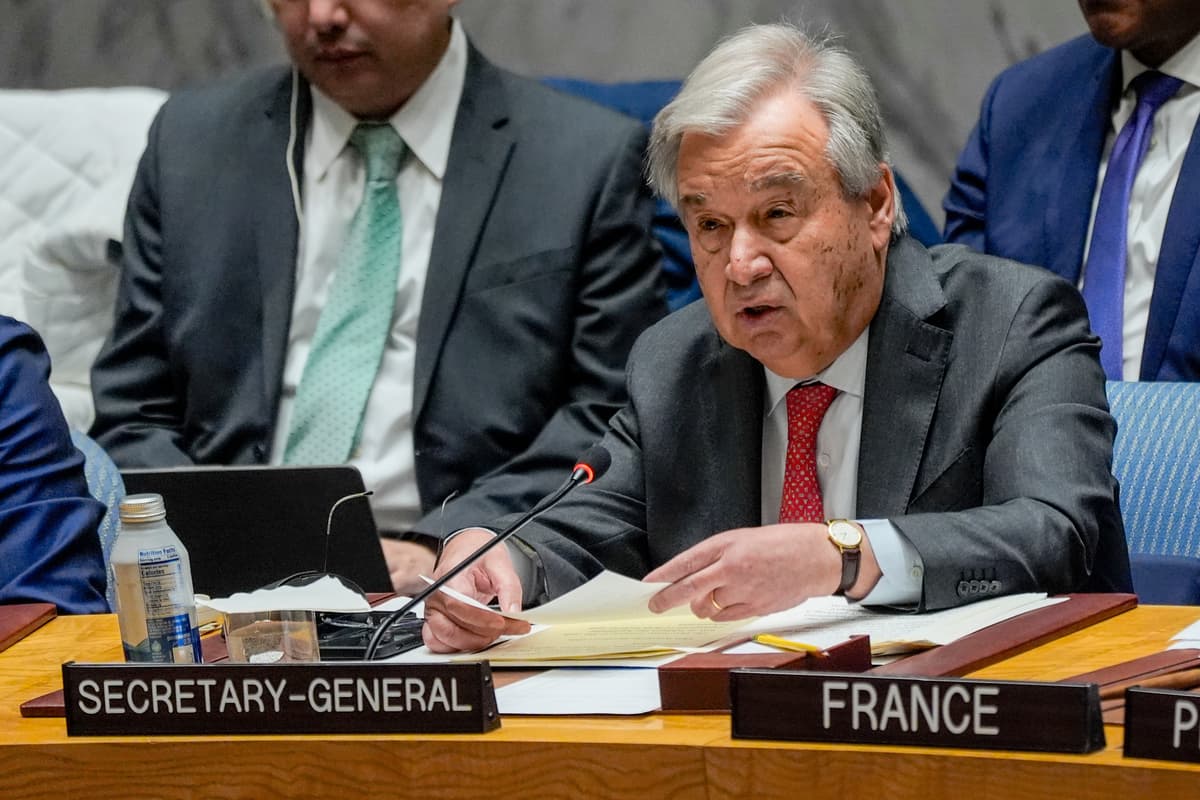Israel, Sparking Outrage at World Body, Shuns UN Secretary-General for Inadequate Condemnation of Iran After Missile Attack
The American UN ambassador, Linda Thomas-Greenfield, is a rare exception among Security Council members in refraining from criticizing Israel’s decision. Instead, she calls on the council to condemn Iran and the Islamic Revolutionary Guards Corps.

Turtle Bay denizens are outraged after the Israeli foreign minister, Israel Katz, declared the United Nations secretary-general, Antonio Guterres, a persona non grata. Jerusalem’s announcement follows Mr. Guterres’s milquetoast statement in reaction to an unprecedented Iranian attack on the Jewish state.
“As I did in relation to the Iranian attack in April — and as should have been obvious yesterday in the context of the condemnation I expressed — I again strongly condemn yesterday’s massive missile attack by Iran on Israel,” Mr. Guterres told the Security Council on Wednesday.
Yet, the terse — and typical — statement he issued Tuesday night failed to cite Iran for launching nearly 200 ballistic missiles, and even indicated that Israel bears some blame for the attack on its citizens: “I condemn the broadening of the Middle East conflict, with escalation after escalation.”
“Anyone who cannot unequivocally condemn Iran’s heinous attack on Israel, as almost every country in the world has done, does not deserve to step foot on Israeli soil,” Mr. Katz said in a statement.
In reality, Israeli officials have long shunned Mr. Guterres, declining to take his calls or banning visits to the country. Jerusalem cited statements that habitually equated Israel to the aggressors, the Islamic Republic’s proxy groups.
Jerusalem earlier exposed a deep Hamas infiltration into the UN’s main agency in Gaza, known as Unrwa. Also, the UN force in Lebanon, Unifil, since 2006 has spectacularly failed to enforce Security Council resolutions, including the disarming of Hezbollah.
“We don’t see this as a slight on the secretary-general, but a continuation of the deteriorating relations between the UN and Israel,” a UN official tells the Sun, referring to Mr. Katz’s announcement.
Mr. Guterres’s spokesman, Stephane Dujarric, reminded reporters that a precedent exists: In 2016, relations between the UN chief, Ban ki-Moon, and Morocco deteriorated after the secretary-general called Western Sahara “occupied.” Morocco declared Mr. Ban’s special envoy to the region, Christopher Ross, persona non grata.
Yet, Mr. Katz’s declaration shook many at the UN headquarters on Wednesday. The British UN ambassador, Barbara Woodward, opened her speech to the Security Council by reiterating “our full and unequivocal support” of Mr. Guterres and “the UN, as they seek to address this crisis.” Others were much more blunt.
“This is an outrageous decision, we’re firmly against it,” Communist China’s ambassador to the UN, Fu Cong, told reporters when asked about Israel’s shunning of the UN chief. “Rubbish,” his Russian colleague, Vassily Nebenzia, added.
Addressing reporters, the Israeli UN ambassador, Danny Danon, said, “We are very disappointed with the secretary-general’s approach.” He detailed a long list of statements by Mr. Giuterres since October 7, 2023, which he said failed to adequately condemn terrorism.
“And yesterday,” Mr. Danon added, “when we were attacked by a member state of the UN with 180 ballistic missiles, 10 million people moving to shelters,” the UN statement “basically called for the escalation, not mentioning Iran, not mentioning who is the aggressor, who is self defending its people.”
The American UN ambassador, Linda Thomas-Greenfield, was a rare exception among Security Council members in refraining from criticizing Israel’s decision. Instead, she called on the council to condemn Iran and the Islamic Revolutionary Guards Corps.
She noted that the Islamic Republic launched its Tuesday attack as revenge for the killing of Hezbollah’s chief, Hassan Nasrallah. “I can think of no starker example of state support of terrorism than launching ballistic missiles to avenge the death of a terrorist leader,” she said.

